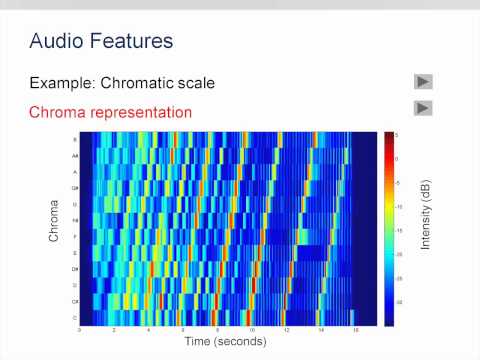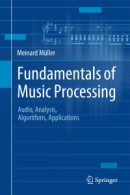Lecture: Music Processing Analysis, Winter Term 2016/2017
Please visit the education page for information on current courses.






-
Instructor: Prof. Dr. Meinard Müller
-
Tutor: Stefan Balke
-
Time: Winter Term 2016/2017, Mo 16-18
-
Exercises (only for Computer Science Students): Mo 14:30-16
-
Place: Am Wolfsmantel 33, Erlangen-Tennenlohe, Room 3R4.04
-
Format: Lecture
-
Credits:
- 2,5 ECTS
- 5 ECTS with Exercises (only for Computer Science Students)
-
Exam (graded): Oral examination at the end of term
-
Flyer: PDF
-
Dates (Lecture) (16:15 - 17:50, Room 3R4.04): Mo 17.10.2016, Mo 24.10.2016, Mo 31.10.2016, Mo 07.11.2016, Mo 14.11.2016, Mo 21.11.2016, Mo 28.11.2016, Mo 05.12.2016, Mo 12.12.2016, Mo 19.12.2016, Mo 09.01.2016, Mo 16.01.2017, Mo 23.01.2017, Mo 30.01.2017
-
Examination Dates (Room 3R4.03)
- Mo 06.02.2017, Tu 07.02.2017, Mo 13.02.2017
Format
The lecture has the following format:
- Every meeting consists of 90 minutes
- There will be additional exercises for computer science students. Details will be announced later.
For further information, please contact Prof. Dr. Meinard Müller.
Content
Music signals possess specific acoustic and structural characteristics that are not shared by spoken language or audio signals from other domains. In fact, many music analysis tasks only become feasible by exploiting suitable music-specific assumptions. In this course, we study feature design principles that have been applied to music signals to account for the music-specific aspects. In particular, we discuss various musically expressive feature representations that refer to musical dimensions such as harmony, rhythm, timbre, or melody. Furthermore, we highlight the practical and musical relevance of these feature representations in the context of current music analysis and retrieval tasks. Here, our general goal is to show how the development of music-specific signal processing techniques is of fundamental importance for tackling otherwise infeasible music analysis problems.
The following video gives a brief impression about this course.
Course requirements
In this course, we discuss a number of current research problems in music processing or music information retrieval (MIR) covering aspects from information science and digital signal processing. We provide the necessary background information and give numerous motivating examples so that no specialized knowledge is required. However, the students should have a solid mathematical background. The lecture is accompanied by readings from textbooks or the research literature. Furthermore, the students are required to experiment with the presented algorithms using MATLAB.
Links
The general area of Music Processing covers a wide range of subfields and tasks such as music anaylsis, music synthesis, music information retrieval, computer music composition, performance analysis, or audio coding not to speak from close connections to other disciplines such as musicology or library sciences. In this course, we present a selection of topics with an emphasis on music analysis and retrieval.
The course "Music Processing Analysis" is closely related to the course Music Processing - Synthesis by Prof. Rudolf Rabenstein. The two courses complement each other, but can also be taken separately.
Further audio-related courses offered by the AudioLabs can be found at:
Accompanying Textbook
Meinard Müller
Fundamentals of Music Processing
Audio, Analysis, Algorithms, Applications
ISBN: 978-3-319-21944-8
Springer, 2015
Exercises (for Computer Science Students)
The exercises, which particulary provided for computer science students, accompany and extend the lecture Music Processing Analysis. In the exercise meetings, we review the lecture, discuss homework problems, deal with programming issues, and realize mini projects that implement basic algorithms and procedures. If you have any questions regarding the exercise, please contact Stefan Balke. Supplementary Demos in Matlab and Python can be found here.
Exercise Meeting 1: 24.10.2016 (14:30 - 16:00)
- Organization and announcements
- Introduction to MATLAB
- Homework 1 (Due: 31.10.2016):
- Work through the script "Preparation Course MATLAB Programming" and get familiar with Matlab syntax (Due: 07.11.2016)
- Text Book: Ex. 1.1, Ex. 1.2a, Ex. 1.5, Ex. 1.6, Ex. 1.8
Exercise Meeting 2: 31.10.2016 (14:30 - 16:00)
- Discussion of Homework 1
- Slides (PDF)
- Introduction of practical exercises (Due: 28.11.2016)
- Practical Exercise 1: Short-Time Fourier Transform (Instructions, Sources)
- Practical Exercise 2: Harmonic-Percussive Source Separation (Instructions, Sources)
- Each group has to hand in solutions and MATLAB implementations of the practical exercises which are to be presented in the meeting on 28.11.2016.
- Homework 2 (Due: 07.11.2016):
- Text Book: Ex. 2.1, Ex. 2.2, Ex. 2.5, Ex. 2.12, Ex. 2.14
- Homework 3 (Due: 21.11.2016):
- Text Book: Ex. 2.3, Ex. 2.4, Ex. 2.15
Exercise Meeting 3: 07.11.2016 (14:30 - 16:00)
- Discussion of Homework 2
- Slides (PDF)
- Python:
- Web Demos: Sampling, Sound Waves, Timbre, DFT, Complex Numbers
Exercise Meeting 4: 21.11.2016 (14:30 - 16:00)
- Discussion of Homework 3
- Slides (PDF)
Exercise Meeting 5: 28.11.2016 (14:30 - 16:00)
- Discuss practical exercises STFT and HPSS.
- Homework 4 (Due: 05.12.2016):
- Text Book: Ex. 3.3, Ex. 3.4, Ex. 3.5, Ex. 3.6
Exercise Meeting 6: 05.12.2016 (14:30 - 16:00)
- Discussion of Homework 4
- Slides (PDF)
- Reading Assignment + Summary (mandatory, Due: 09.01.2017):
- Choose one of the following chapters from the Text Book: 4, 5, 6, 7, 8
- Each group has to hand in a summary (mandatory) of the assigned book chapter as a PDF until 09.01.2017. Please send the PDF via e-mail to Prof. Dr. Meinard Müller and Stefan Balke.
- Written in English, min. 2 pages
- Latex sources for the summary's template (with additional explanations) can be found here: ZIP
- Homework 5 (Due: 12.12.2016):
- Text Book: Ex. 3.7, Ex. 3.8, Ex. 3.10, Ex. 3.13
Exercise Meeting 7: 12.12.2016 (14:30 - 16:00)
- Discussion of Homework 5
- Homework: Think of possible Course Project (Due: 19.12.2016)
Exercise Meeting 8: 19.12.2016 (14:30 - 16:00)
- Discussion and Fixing Course Projects
- The topic should be related to the lecture or Text Book.
- Course Project (Due: 30.01.2017)
- Write a small program to approach your idea.
- Prepare a short presentation (2 minutes, StudOn material should be used).
- Prepare a demo running on your own computer.
- Document in our StudOn Wiki (in the style of the example-project).
Exercise Meeting 9: 23.01.2017 (14:30 - 16:00)
- Discussion of Course Projects
- First demos
- Documentation on WIKI StudOn group (group password required - can be obtained by mail)
Exercise Meeting 10: 30.01.2017 (14:30 - 16:00)
- Presentation of your Student Projects
Topics
- Introduction
Slides (PDF), Handouts (6 slides per page) (PDF) - Overview
Slides (PDF), Handouts (6 slides per page) (PDF) - Music Representations
Slides (PDF), Handouts (6 slides per page) (PDF)
Literature: Chapter 1 - Audio Features (Fourier Transform, Spectrogram, Pitch, Chroma)
Slides (PDF), Handouts (6 slides per page) (PDF)
Literature: Section 2.1, Section 3.1 - Music Synchronization (Dynamic Time Warping)
Slides (PDF), Handouts (6 slides per page) (PDF)
Literature: Section 3.2, Section 3.3 - Music Structure Analysis
Slides (PDF), Handouts (6 slides per page) (PDF)
Literature: Chapter 4 - Tempo and Beat Tracking
Slides (PDF), Handouts (6 slides per page) (PDF)
Literature: Chapter 6 - Audio Retrieval
Slides (PDF), Handouts (6 slides per page) (PDF)
Literature: Chapter 7 - Applications of Music Processing (Christian Dittmar)
Slides (PDF), Handouts (6 slides per page) (PDF)



